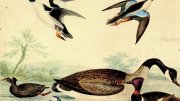Touching America’s History, by Meredith Mason Brown ’61, J.D. ’65 (Indiana, $30). The author, a biographer of Daniel Boone, does “better in history when it becomes concrete and personal.” Here, he surveys historical events from the Pequot War through World War II through 20 revealing objects.
A History of the Present Illness, by Louise Aronson, M.D. ’92 (Bloomsbury, $24). A geriatric specialist with an M.F.A., Aronson has crafted 16 short stories for patients, families, and doctors about the experience of ill health. She has a physician’s directness: “Wednesday, the day the boy fell…” is a typical opening.
Alexander Wilson: The Scot Who Founded American Ornithology, by Edward H. Burtt Jr. and William E. Davis Jr. (Harvard, $35). A scholarly appreciation and analysis of the creator of the nine-volume American Ornithology (whose letters and draft artwork are in Harvard’s collections)—who may have lacked Audubon’s artistic/marketing flair. Profusely illustrated.
The Brothers Emanuel, by Ezekiel J. Emanuel, M.D. ’85, Ph.D. ’89 (Random House, $27). A family memoir by one-third of a trio of busy, driven brothers, including siblings Rahm, now mayor of Chicago, and Ari, a Hollywood talent agent. It is unclear when the author (a Penn professor and former special adviser for health policy during President Obama’s first term) has uninterrupted time at the keyboard.
Adrenaline, by Brian B. Hoffman, professor of medicine (Harvard, $24.95). A brisk, accessible, useful guide to a molecule with, as Hoffman writes, “enormous cultural significance” for its association with “medically important stress and with excitement, anger, and terror”—and corresponding appearances in the language (a “shot” of, “junkies” for the associated “rush,” etc.).
The Practitioner’s Guide to Governance as Leadership, by Cathy A. Trower (Jossey-Bass, $60). What makes a nonprofit board seat—often a sinecure or an empty title—a high-performing contributor to the organization? Trower, a senior researcher at Harvard Graduate School of Education, draws on deep, broad research to model effective behavior. Studded with examples.
Letters to a Young Scientist, by Edward O. Wilson, Pellegrino University Professor emeritus (Liveright, $21.95). Once again writing in a new form (Anthill, a novel, appeared in 2010), the pioneering sociobiologist and myrmecologist flowers at his humanistic best, counseling young researchers on the passions and pursuits that go into life-enhancing science.
Recognizing Public Value, by Mark H. Moore, Hauser professor of nonprofit organizations and Simon professor in education, management, and organizational behavior (Harvard, $59.95). The author, whose work at the University spans the schools of government, education, and business, undertakes the hard scholarly work of performance measurement for value created in, for example, schooling, policing, public health, or other areas. Contemporary political debate rarely acknowledges that such goods exist, or can be measured. Moore’s scholarship is a rebuttal.
The Human Spark, by Jerome Kagan, Starch professor of psychology emeritus (Basic Books, $28.99). A vividly titled overview, by the pioneering developmental psychologist, of his current thinking about the answer to the question, “What does it mean to be human?” Reading him, one resonates to the kind of teacher he must have been.
Children’s Chances, by Jody Heymann, M.D. ’88, M.P.P. ’89, Ph.D. ’92, with Kristen McNeill (Harvard, $45). The recently appointed dean of the UCLA Fielding School of Public Health, a pediatrician, and her coauthor survey the world to make a case for policies that can improve the lot of children and enhance their development around the globe.
Translucent Building Skins, by Scott Murray, M.Arch. ’96 (Routledge, $49.95 paper). By looking at, rather than merely through, “material innovations in modern and contemporary architecture,” from lesser-known works to Gehry Partners’ glitzy InterActiveCorp headquarters in New York, the architect-author, who also teaches at the University of Illinois, has created an eye-opening, thought-expanding, beautiful work.
Priests of Our Democracy, by Marjorie Heins, J.D. ’78 (New York University, $35). A fine-grained history of the early-1950s loyalty investigations of New York City teachers and professors, and the resulting battles, all the way up to the Supreme Court. The author is founding director of the Free Expression Policy Project.
The Martian’s Daughter, by Marina von Neumann Whitman ’56 (University of Michigan, $30). A memoir by the famous mathematician’s daughter, no quantitative slouch herself: now back in academia, at Michigan, she was the first woman member of the President’s Council of Economic Advisers, and vice president and chief economist of General Motors (at a time and in an industry not notably given to female senior executives).
Tested by Zion: The Bush Administration and the Israeli-Palestinian Conflict, by Elliott Abrams ’69, J.D. ’73 (Cambridge, $30). The former adviser to Senators Henry Jackson and Daniel Patrick Moynihan, and to Presidents Ronald Reagan and George W. Bush, provides an insider’s first-draft account of diplomacy in one of the world’s perennially challenging areas.
Saving Italy, by Robert M. Edsel (W.W. Norton, $28.95). The race to rescue Italy’s art masterpieces during World War II. A companion to the author’s The Monuments Men (excerpted in “The Arts Army,” January-February 2010, page 36), this new volume is populated with Harvardians, too—including the late Mason Hammond ’25, LL.D. ’94, future Pope professor of the Latin language and literature.
That’s Not Funny, That’s Sick, by Ellin Stein (W.W. Norton, $27.95). An enormous history of the Harvard-spawned National Lampoon and “the comedy insurgents who captured the mainstream.” (See “Funniest Pages,” November-December 2010, page 28, for a review of Drunk Stoned Brilliant Dead, on the same subject.)









